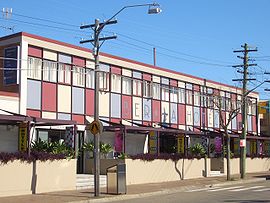Berala is an inner suburb of Sydney, which connects the inner west, south west and western parts of Sydney in the state of New South Wales, Australia, located only 16 kilometres west of the central business district, in the local government area of Cumberland Council. Postcode: 2141, sharing it with Lidcombe.
| Berala Sydney, New South Wales | |||||||||||||||
|---|---|---|---|---|---|---|---|---|---|---|---|---|---|---|---|
 Berala Hotel, Woodburn Road | |||||||||||||||
 | |||||||||||||||
| Population | 8,757 (2021 census)[1] | ||||||||||||||
| Postcode(s) | 2141 | ||||||||||||||
| Elevation | 28 m (92 ft) | ||||||||||||||
| Location | 16 km (10 mi) west of Sydney CBD | ||||||||||||||
| LGA(s) | Cumberland Council | ||||||||||||||
| State electorate(s) | Auburn | ||||||||||||||
| Federal division(s) | |||||||||||||||
| |||||||||||||||
History
editBerala is derived from Bareela, an Aboriginal word for a musk duck. When the railway line was being extended from Lidcombe to Regents Park, the names Torrington, Sidmouth and Bareela were considered. The station opened in 1912, the public school in 1924 and the post office in 1927.[2]
Transport
editBerala railway station is on the Main Southern railway line. Bus services run between Auburn and Bankstown.
Commercial area
editA small group of shops is located beside the railway station, including a Charcoal Chicken, a newsagent and the EVT bakery. A Woolworths is located next to the train station.
Demographics
editAccording to the 2021 census, there were 8,757 residents in Berala. The most common reported ancestries were Chinese 37.4%, English 8.2%, Australian 7.1%, Vietnamese 5.6% and Lebanese 4.3%. 35.6% of people were born in Australia. The next most common countries of birth were China 17.3%, Vietnam 8.6%, Philippines 3.2%, South Korea 2.6% and Afghanistan 1.9%. 21.3% of people only spoke English at home. Other languages spoken at home included Mandarin 18.0%, Cantonese 14.4%, Arabic 5.9%, Vietnamese 4.8% and Korean 3.1%. The most common responses for religious affiliation were No Religion 27.4%, Catholic 18.1%, Islam 14.8% and Buddhism 12.4%.[1]
Berala was, up until recent years a traditional working-class suburb. Over the past decade till now, Berala has been experiencing the processes of gentrification due to its increasingly central location to the city & amongst other major small cities such as Parramatta & Miranda etc with the westward expansion and development of the Sydney metropolitan area, reflecting the waves of immigration to Australia in the 21st century. More and more professionals and skilled workers choose to live in this convenient and matured community.Its location is in the central part of Sydney, but still has a village type of atmosphere.
Schools
editBerala Public School is the local public primary school. St Peter Chanel Catholic Primary School caters for primary aged children mainly of Roman Catholic denomination. There is also Trinity Junior Catholic College (formerly known as St Peter Chanel Girls High School).
Sport and recreation
editThe Berala Community Centre is currently of use for recreation activities.
Coleman Park comprises two full-size soccer fields, two mini soccer fields, a baseball field, a children's recreation area and basketball facilities. The Lidcombe Waratahs soccer club is based there.
The Berala Bears is a junior rugby league team that plays in the Canterbury-Bankstown District Junior Rugby League competition. Their colours are gold and black, and their home ground is at Guilfoyle Park in the neighbouring suburb of Regents Park. Former Berala Bears players include Brisbane Broncos forward Terry Matterson, Sydney Roosters winger Daniel Tupou, former Canterbury-Bankstown Bulldogs and Wests Tigers winger Matt Utai, South Sydney Rabbitohs half Jeremy Smith, Manly-Warringah Sea Eagles forward Anthony Watmough, South Sydney Rabbitohs hooker Apisai Koroisau and Sydney Roosters utility player Samisoni Langi, Melbourne Storm winger Isaac Lumelume.
References
edit- ^ a b Australian Bureau of Statistics (28 June 2022). "Berala (State Suburb)". 2021 Census QuickStats. Retrieved 4 August 2024.
- ^ The Book of Sydney Suburbs, Compiled by Frances Pollon, Angus & Robertson Publishers, 1990, Published in Australia ISBN 0-207-14495-8, page 27
2021 Census QuickStats. Retrieved 26 May 2024. Edit this at Wikidata
External links
edit- Laurence Gordon (2008). "Berala". Dictionary of Sydney. Retrieved 25 September 2015. [CC-By-SA]